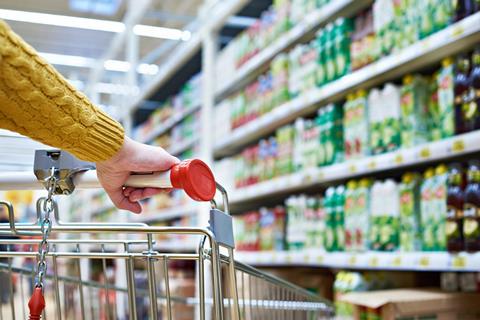
Top story
Take-home grocery figures from Kantar show that supermarket sales fell by 3.8% over the 12 weeks to 23 January 2022, despite prices continuing to rise as inflation mounts.
Kantar said the drop in year-on-year figures reflect tough comparisons against the high demand of the lockdowns at the start of 2021, with spending remaining 8% higher than pre-pandemic times.
These market growth figures also do not include on-the-go food and drink purchases, which are likely to be higher than last year.
Kantar found grocery sales were down by 3% in the previous three months to 26 December.
It noted that households in Britain are facing a cost-of-living squeeze and the latest four-week grocery price inflation stands at 3.8%, a 0.3 percentage point rise from December.
Fraser McKevitt, head of retail and consumer insight at Kantar, commented: “Prices are rising on many fronts, and the weekly shop is no exception. Like-for-like grocery price inflation, which assumes that shoppers buy exactly the same products this year as they did last year, increased again this month.
“Taken over the course of a 12-month period, this 3.8% rise in prices could add an extra £180 to the average household’s annual grocery bill. We’re now likely to see shoppers striving to keep costs down by searching for cheaper products and promotions. Supermarkets that can offer the best value stand to win the biggest slice of spend.”
On an individual grocery basis, Lidl and Aldi were the only two physical grocers in growth – at 1.2% and 1.1% respectively.
Tesco was the best performing of the Big Four, down 1.9%, with Sainsbury’s down 4.8%, Asda 5.3% and Morrisons 8.5%.
Tesco’s two-year growth of 10.1% is now more than double that of Morrisons (4.6%) and Asda (4%).
Co-op was down by 7.8% to take its two-year growth back to just 2.7%, while Waitrose fell 1.8% with two-year growth of 9.4%.
Ocado was again the best performing grocery retailer, with the online specialist up 2.3% to reach two-year growth of 39.7%.
Fraser McKevitt said the findings represented a normalisation of shopping trends as pandemic restrictions eased.
He said: “Increasing confidence about heading out and about, combined with the return to the office, means we’re starting to see pre-pandemic shopping patterns once again. Since the first lockdown in March 2020, shoppers have been buying in bulk and visiting the supermarket less often.
“But basket sizes are now 10% smaller than this time last year, hitting their lowest level since the beginning of the pandemic, while footfall increased by 5% as every major retailer was busier in their stores. Changing habits were most marked in London, where take-home sales of food and drink decreased by 11%. This suggests that people in the capital were the quickest to embrace eating out in cafés, pubs, and restaurants as many of us returned to city centres.”
Increased confidence in visiting stores was also reflected in online grocery sales, with McKevitt adding “Digital orders accounted for 12.5% of all grocery spend, almost double the pre-pandemic proportion. Though online purchases are down year-on-year by 15%, it’s important to remember that this is in comparison with the strict lockdown we faced in January 2021 when the public was staying indoors when possible.”
Morning update
AG Barr has posted a 17.5% jump in annual sales in the 53 weeks to 30 January 2022 – slightly ahead of previous guidance.
Revenues for the full year were £267m, exceeding pre-pandemic revenue performance of £255.7m in 2019/20, which also included £21m of Rockstar brand revenue.
AG Barr said the “strong” trading performance was achieved despite the increased UK Government restrictions related to the Omicron Covid variant and “further emphasises the quality and resilience of our brands, business model and people”.
While Government restrictions have impacted consumer behaviour across the year, both its Barr Soft Drinks and Funkin business units have traded well, particularly during the periods when restrictions were eased.
The inflationary pressures highlighted in our November 2021 update have materialised as expected, particularly across packaging and energy linked commodities.
The group said it has initiated several cost control actions to reduce the impact of these rising costs and have adjusted pricing with customers where appropriate.
“With the published rate of inflation in the UK now above 5%, the highest level for 20 years, we will continue to seek opportunities across the coming year to offset the impact on our business,” it stated.
Operating margin before exceptional items for the financial year is expected to be around 15.6% (up from 14.8% last year), delivering profit before tax and exceptional items marginally ahead of November 2021 guidance.
CEO Roger White commented: “We are delighted with both the resilience our business has demonstrated and the growth we have delivered. We have remained fully operational throughout the year, producing high quality products and providing strong business support to all of our customers. We have delivered an excellent financial performance against a volatile backdrop, whilst at the same time delivering on our strategic priorities, with particularly encouraging progress made across our No Time To Waste environmental sustainability programme.
“We plan to further invest in our business in 2022/23 and remain confident in our ability to deliver continued growth in both revenue and profit in the coming year.”
On the markets this morning, the FTSE 100 has rised 0.9% up to 7,533.5pts this morning.
Early risers include Nichols, up 6.6% to 1,385.8p, Deliveroo, up 4.6% to 161.5p and Just Eat Takeaway, up 3.6% to 3,740.5p.
Fallers include Ocado, down 1.5% to 1,481p, British American Tobacco, down 1% to 3,133p and Imperial Brands, down 0.9% to 1,735p.
Yesterday in the City
The FTSE 100 started the week flat, edging down a couple points to 7,464.4pts yesterday.
Supermarkets were amongst the few significant fallers, with Tesco down 2.1% to 297p and Sainsbury’s down 2.8% to 290.7p.
Other fallers included Nichols, down 4.2% to 1,300p, Parsley Box, down 3.2% to 30.5p, Tate & Lyle, down 2.9% to 706.4p and WH Smith, down 2% to 1,648p.
The day’s risers included a number of tech firms, such as Just Eat Takeaway.com, up 5.8% to 3,611p, Deliveroo, up 5.4% to 154.4p, Ocado, up 4.3% to 1,504p and THG, up 4.2% to 131.8p.
Other risers included McBride, up 4.2% to 50p, Hilton Food Group, up 3.4% to 1,038p, FeverTree, up 2.6% to 2,133p and Premier Foods, up 2.3% to 118p.







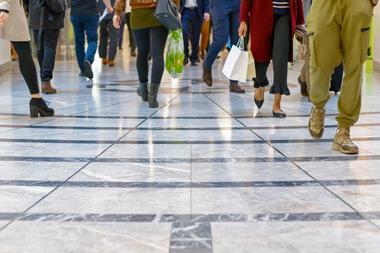

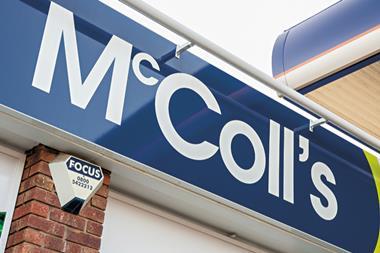
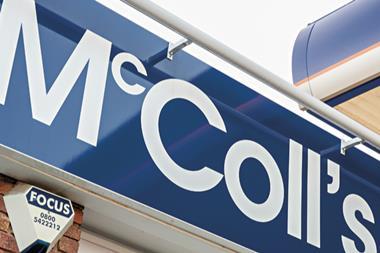
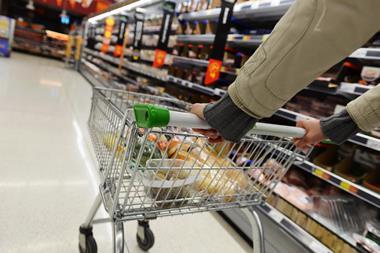







No comments yet